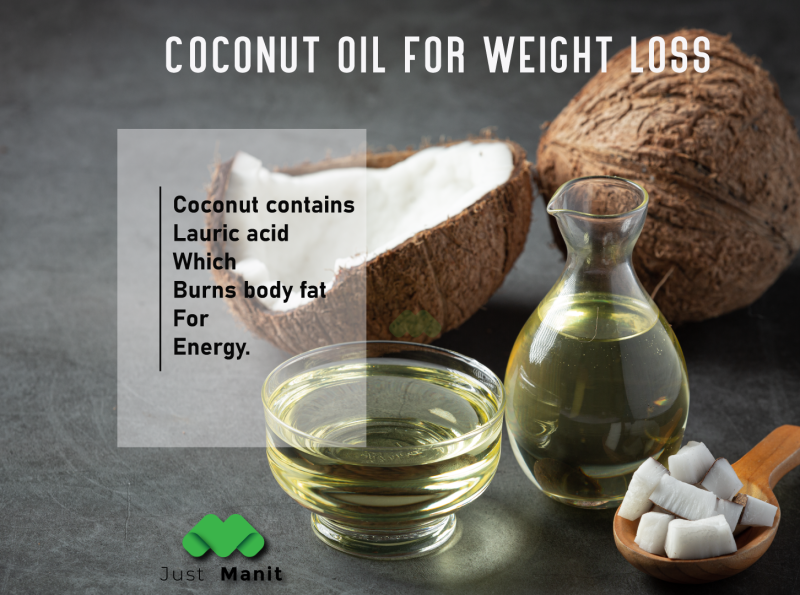From trending bulletproof coffee to skincare to weight loss, what we cannot miss nowadays is coconut oil. No wonder with all the countless benefits of coconut oil, it is the trendiest healthy fat even used by individuals for weight loss purposes. If it is the matter, you must have a question in mind, “how much coconut oil is for weight loss?”
In this article, you will get to acknowledge the correct dosage of coconut oil for adults and how to use this oil for your diet to achieve weight loss.
What is coconut oil?
Everyone is familiar with this oil made out of big flesh of coconuts. The cold-pressed and unrefined coconut oil extracted with less heat has much more nutritional value than the refined and hydrogenated coconut oil. So, the cold-pressed and unrefined oil are called “virgin” in the market, gaining more popularity than the refined and hydrogenated ones. Coconut oil is around 90 percent fats.
One tablespoon of coconut oil weighing around 13 grams contains 121 calories, with approximately 12.8 grams of fat. Most of the fat in the oil is saturated fat. However, this saturated fat differs from the fat of animal products as it is high in long-chain fatty acids.
Saturated fats can be further divided into short-chain, medium-chain, and long-chain fatty acids. Unlike long-chain fatty acids found in animal fats, coconut oil is rich in medium-chain fatty acids, which are not stored in the body as fat but absorbed directly into the bloodstream, boosting metabolism.
Does coconut oil help weight loss?
Coconut oil can boost metabolism by absorbing minerals and vitamins with its medium-chain fatty acids, mainly lauric acid. Lauric acid has various health benefits and promotes ketosis, in which the body burns fat for energy. Thus, the faster metabolism rate leads to burning more calories and shedding extra pounds in the body. It primarily aids in reducing belly fat, which is a common problem among many people. This oil consumption causes a rise in high-density lipoprotein cholesterol, also called HDL cholesterol, which is luckily good cholesterol for your body.

A feeling of fullness naturally would help you lose weight; thankfully, coconut oil helps curb hunger, making you feel fuller for an extended period. Just one tablespoon of coconut oil in your coffee in the morning helps to minimize your appetite for a longer time, ensuring fewer calorie intakes and leading to weight loss.
Thus, coconut oil’s unique ability to prevent fat accumulation, boost metabolism, and curb hunger allows us to burn belly fat and aids in weight loss.
How much coconut oil for weight loss?
As we know, coconut oil is 100% fat; when consuming coconut oil, you must be careful about calorie intake. Anything in moderation is okay, but excess consumption of coconut oil may lead to weight gain.
According to studies, two tablespoons of coconut oil seem to be an effective dosage for an adult, which is considered 30 ml. You can combine coconut oil into your diet in various ways, but you can start with a tablespoon of coconut oil and gradually move to 2 tablespoons within a few weeks. Initially, consuming two tablespoons of coconut oil can make you feel nauseous and cause diarrhea symptoms as well.
Thus, consuming two tablespoons of coconut oil per day is enough to reap its health benefits, leaving space for other healthy fats in your body like olive oil, avocados, and nuts.
Two tablespoons of coconut oil provide around 120 calories with 18 grams of medium-chain triglycerides that have been shown to raise the body’s metabolic rate.
How to add coconut oil to your diet?
This healthy fat must go on your diet, not only for weight loss but also for coconut oil’s other health benefits. Here are a few tips on using coconut oil on your diet moderately to accomplish weight loss and other health benefits.

Tip number #1
Like other foods, the consistency of coconut oil affects its possible health benefits. Always choose organic, unrefined, and cold-pressed coconut oil to include in your diet.
While unrefined oils are processed without heat and are best used for low-heat baking and cooking, refined oils have a higher smoke point and are used for higher-heat cooking methods.
However, refining destroys some nutrients and some of the essence of coconut.
Tip number #2
One of the best ways to include coconut oil in your diet is by adding some drops of coconut oil to your coffee or tea. You can add half a teaspoon or a teaspoon of coconut oil to your morning coffee, giving your coffee a pleasing aroma and making you complete for an extended time. You can add it to your tea also.
Tip number #3
You can use coconut oil for cooking and baking your favorite culinary recipes. Coconut oil is ideal for frying and cooking due to its high smoke point of 175°C. The coconut oil is semi-solid at room temperature and melts at 24°C. You can fry eggs, meat, and vegetables, adding a tablespoon of coconut oil. You can also utilize it for stir-frying and baking purposes.
Tip number #4
You can try the exciting recipes by using coconut oil by making it a substitute for oil and butter. Adding it to smoothies and protein shake is also a good option. You can search for many mouth-watering recipes that use coconut oil.
Bottom line
There is no dilemma that coconut oil is a healthy fat with loads of health benefits when consumed in balance. Coconut oil is high in calories, and the excess consumption of coconut oil can cause weight gain in the long run.
To get the most benefits of coconut oil, make sure you go with pure, unrefined, and least processed coconut oil. Make sure you examine the label and avoid hydrogenated coconut oil.
Coconut oil adds flavor to your drinks and diet, but don’t get it confused with super food. Always consume in moderation with enough physical activity to burn the calories you are consuming.


